Bulgarian masquerade rituals go back thousands of years to the earliest pagan times. Masquerade games were practiced as the new year took over from the old and during nature’s spring awakening. The message they conveyed was of banishing the powers of evil with wishes for health and fertility during what are known as the “dirty days” of the year.
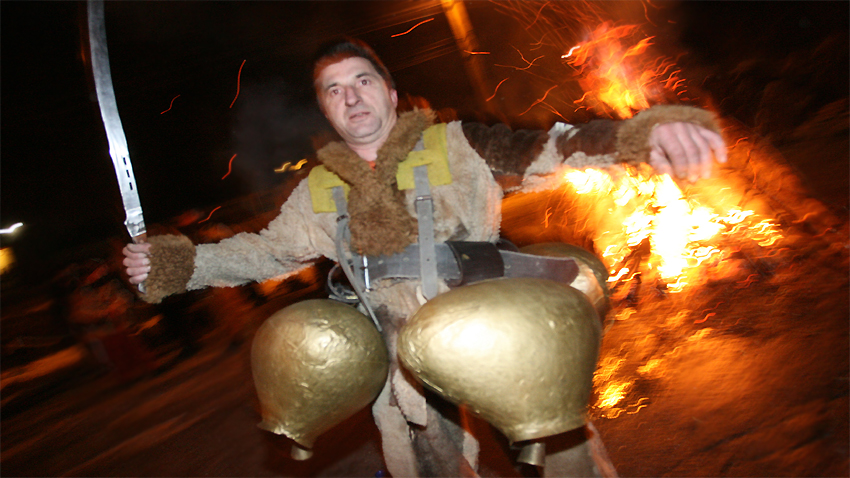
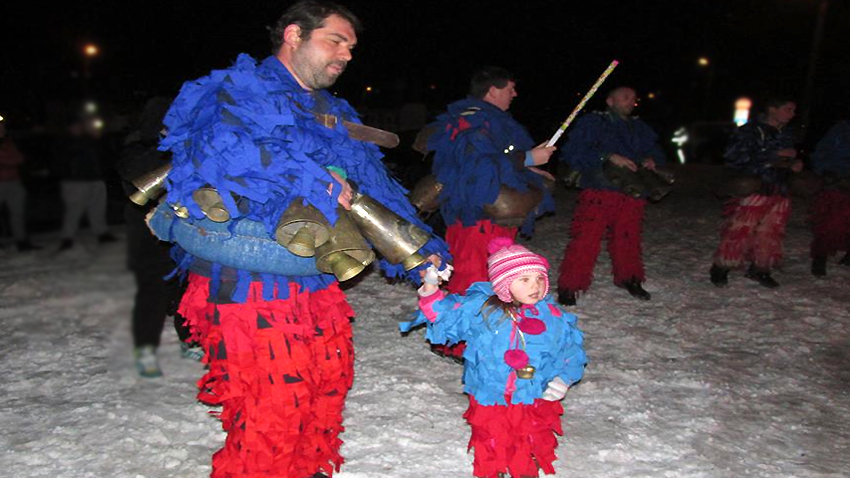 The masked men would proceed with a distinctive gait, wearing terrifying masks and original costumes with dangling bells and clappers, big and small. Masquerade games in Bulgaria are a living tradition that is passed down from generation to generation. The winter Surva rituals are typical of Central Western Bulgaria – the towns and villages in the vicinity of Pernik, Breznik, Zemen and Radomir. The performers from the bands of survakari are known as surovichkare, survaskare. By a tradition the groups of men, dressed up as a bride, a groom, a father-in-law and a mother-in-law are the first to enter the homes in the village to bless the households. Other characters in the group include a priest, a bear, a gypsy and the musicians that invariably accompany them. The outlandish masks the survakari put on are conjured up by their own imagination. Their clothes are made of pieces of cloth shredded into ribbons or sheepskin coats, worn inside out. Children join in the games alongside their fathers – a sign that the tradition lives on.
The masked men would proceed with a distinctive gait, wearing terrifying masks and original costumes with dangling bells and clappers, big and small. Masquerade games in Bulgaria are a living tradition that is passed down from generation to generation. The winter Surva rituals are typical of Central Western Bulgaria – the towns and villages in the vicinity of Pernik, Breznik, Zemen and Radomir. The performers from the bands of survakari are known as surovichkare, survaskare. By a tradition the groups of men, dressed up as a bride, a groom, a father-in-law and a mother-in-law are the first to enter the homes in the village to bless the households. Other characters in the group include a priest, a bear, a gypsy and the musicians that invariably accompany them. The outlandish masks the survakari put on are conjured up by their own imagination. Their clothes are made of pieces of cloth shredded into ribbons or sheepskin coats, worn inside out. Children join in the games alongside their fathers – a sign that the tradition lives on.
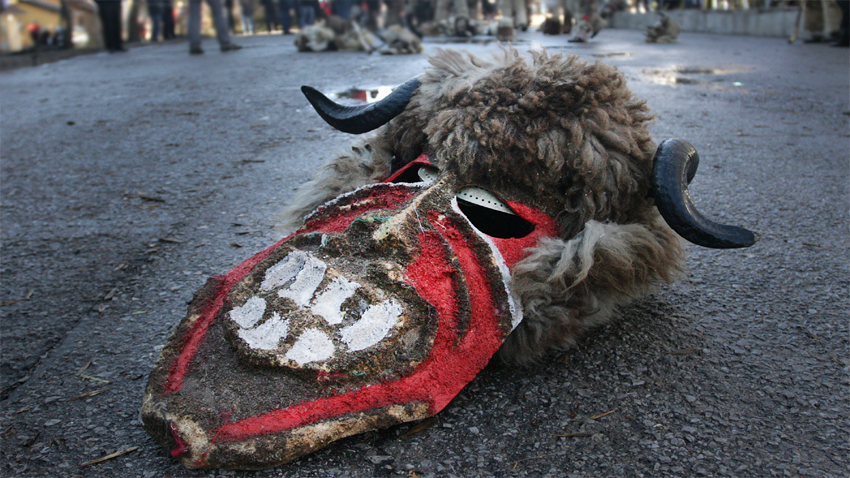 The ritual is on the UNESCO Intangible Cultural Heritage of Humanity list. Here is Mrs. Ivanka Vassileva, chief expert at the Culture department of Pernik municipality with more about this year’s Surva:
The ritual is on the UNESCO Intangible Cultural Heritage of Humanity list. Here is Mrs. Ivanka Vassileva, chief expert at the Culture department of Pernik municipality with more about this year’s Surva:
“What would we, in Pernik and the environs do without our Surva? Without that night of the year when, century after century, young men wearing masks, stiff with the cold but brimming with joy and energy sweep through the streets to the sound of the bells they carry? This year 55 towns and villages lit a Surva fire. The ritual is played out on the night of January 13. By an old tradition, families get together on Vassilyovden (Day of St. Basil, old style), the grandest feast-day in these parts. In the centre of every village a ritual fire is lit, masked men dance around it, heralding the victory of good over evil by making as much noise as they can. We had many guests, as well as representatives of UNESCO, professors from the Institute of Folklore, journalists. The houses were thrown open, the tables were laid with food, men clad in sheepskins and wearing terrifying costumes made the rounds of the houses to drive away evil and bless the households with wishes for health and fertility, to light the fire that has the power to cleanse.”
The 26th edition of the Surva – Pernik, 2017 International Folklore Festival of Masquerade Games will be held on January 27, 28 and 29. The town has been a member of the Federation of European Carnival Cities since 1995. Masquerade groups demonstrating winter as well as spring rituals, known as survakari and kukeri, will flock from all corners of Bulgaria to take part in the contest.
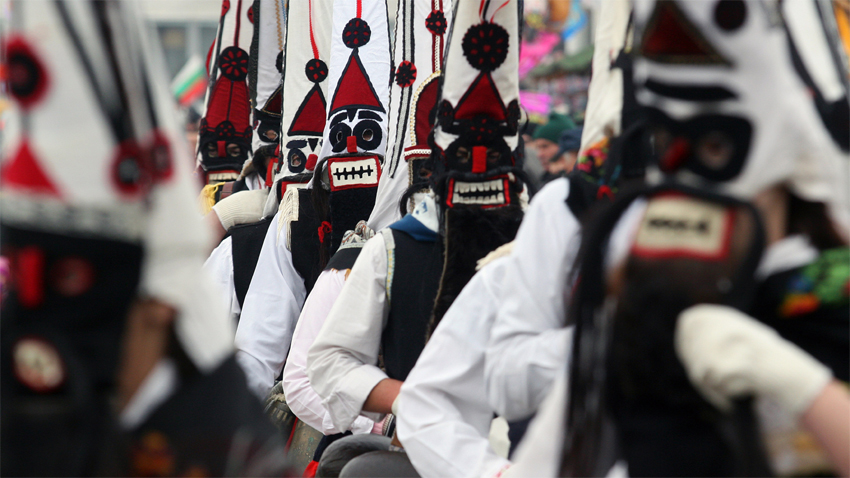 “This year’s edition will set a record with 118 groups taking part. This number really is for the Guinness Book of Records. In Rio de Janeiro there have been around 6,000 participants in recent years. We have a record number of participants – 6,944 have said they will take part. The word Surva means strength, power. What can be more powerful than close to 7,000 people coming to our town to demonstrate the energy of tradition? There will be 7 or 8 groups coming to our festival for the first time. More than 1,300 children will come from all corners of Bulgaria to take part in the festival. A scientific conference “Masquerades in villages and towns” opens on 27 January - it has become a tradition in Pernik. The Surva’s Children kindergarten will demonstrate the ritual at the youth complex. Expert mask makers from Bulgaria will be demonstrating their skills at the so-called “bear” mask-making workshop that will be open on the three festival days from 10 AM until 6 PM. And anyone can try their hand at making a mask or can buy one. An exhibition will be presented by Nikola Vrancic, a survakari group leader from Croatia, displaying more than 20-30 masks. During one of his visits to Bulgaria, Vrancic was very impressed by our masks and started making masks of his own. A Survakariad will be organized before the official opening with more than 500 children demonstrating our rituals. Surva Fire is the title of the grand opening concert. But the biggest attraction will be the processions of 50-60 groups over the two days of the festival, from 10 AM until 6 PM. 16 groups from abroad will be taking part – from Croatia, Slovenia, Macedonia, Serbia, Sardinia – Italy, Albania, Aruba. There will be a stage where the Bulgarian groups will perform, with their masks and costumes, after the procession is over. A children’s fair with a workshop for masks, puppets and costumes will be organized at the Youth House. The stage designated for the groups from abroad will be particularly interesting.”
“This year’s edition will set a record with 118 groups taking part. This number really is for the Guinness Book of Records. In Rio de Janeiro there have been around 6,000 participants in recent years. We have a record number of participants – 6,944 have said they will take part. The word Surva means strength, power. What can be more powerful than close to 7,000 people coming to our town to demonstrate the energy of tradition? There will be 7 or 8 groups coming to our festival for the first time. More than 1,300 children will come from all corners of Bulgaria to take part in the festival. A scientific conference “Masquerades in villages and towns” opens on 27 January - it has become a tradition in Pernik. The Surva’s Children kindergarten will demonstrate the ritual at the youth complex. Expert mask makers from Bulgaria will be demonstrating their skills at the so-called “bear” mask-making workshop that will be open on the three festival days from 10 AM until 6 PM. And anyone can try their hand at making a mask or can buy one. An exhibition will be presented by Nikola Vrancic, a survakari group leader from Croatia, displaying more than 20-30 masks. During one of his visits to Bulgaria, Vrancic was very impressed by our masks and started making masks of his own. A Survakariad will be organized before the official opening with more than 500 children demonstrating our rituals. Surva Fire is the title of the grand opening concert. But the biggest attraction will be the processions of 50-60 groups over the two days of the festival, from 10 AM until 6 PM. 16 groups from abroad will be taking part – from Croatia, Slovenia, Macedonia, Serbia, Sardinia – Italy, Albania, Aruba. There will be a stage where the Bulgarian groups will perform, with their masks and costumes, after the procession is over. A children’s fair with a workshop for masks, puppets and costumes will be organized at the Youth House. The stage designated for the groups from abroad will be particularly interesting.”
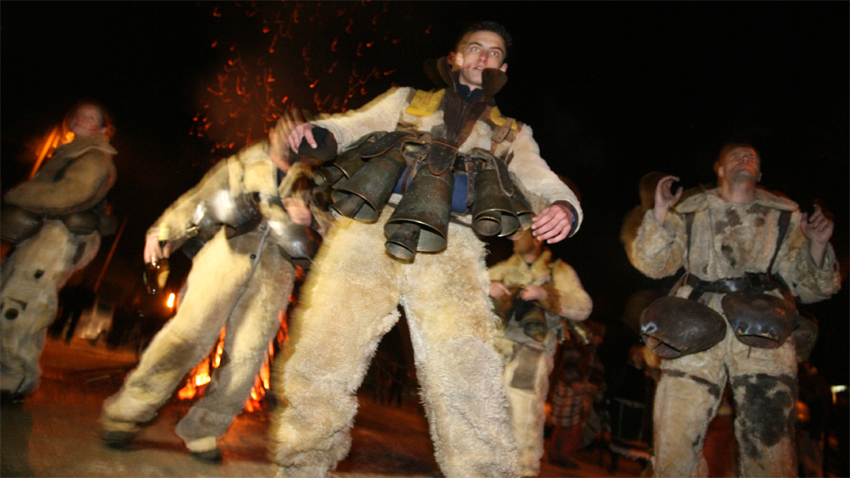
English version: Milena Daynova
On 22 November, the Association of Bulgarian Folk Ensembles Abroad (ABFEA) will present its project, 'Online Catalogue of Bulgarian Horo and Other Dances', in three European cities: Lyon, Munich and Copenhagen. 'Our goal is to preserve Bulgarian..
‘The Bulgarian horo is a kind of magic — an enchanted circle that pulses with the unique energy of our spirit, our traditions and our identity,’ says journalist Milena Milotinova, who recently presented her new documentary The Magic of the Bulgarian..
The Eastern Rhodopes come to life in the heart of Sofia – with authentic flavoуrs, music and craftsmanship . Residents of the Bulgaria capital have a chance to immerse themselves in the atmosphere of Momchilgrad Municipality and its cultural and natural..

+359 2 9336 661
